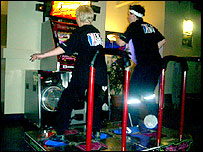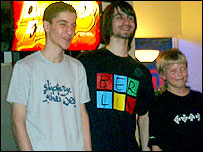|
By Jo Twist
BBC News Online technology reporter
|

Video games have often been
criticised for creating a sedentary hobbyist, content with sitting
in front of a console for hours.

Watching two at a time is
mesmerising |
Physical
or party games, like PlayStation 2's EyeToy, have gone some way to
change that perception and have set pulses racing.
But there is a growing community of European gamers who are truly
sweating it out weekly, even daily, on the dance floor - one that is
about a metre squared.
DDR, Dance Dance Revolution, started life as a Konami arcade
video game back in the late 1990s.
Since then, there have been several version of the machine with
catalogues of tracks on them. A huge community has grown up around
DDR in the USA and Asia, particularly in Japan, who are well-known
lovers of musical games.
The US and Japan have professional teams and are well organised
in terms of competitions.
But after taking some faltering baby steps in Europe, DDR has
started to strut its stuff officially in the last three years.
Sporty jigs
"It has become very popular in several countries, but in many it
is still completely unknown," says Ole Petter Hoie, managing
director of Positive Gaming, co-organisers of the first official DDR
Europe Tournament.
"But in the UK, Italy and now in Norway, it has become very big
and it is growing in other countries also."
To many within the DDR community, it is considered to be a sport,
and it is about to be registered officially as such in Norway.
The tournament, held in London last month, was the first official
competition using rules which have been decided on by the DDR
community.
 |
 The
online community powers the game, it's what actually gives
people the urge to actually go on and continue playing the
game The
online community powers the game, it's what actually gives
people the urge to actually go on and continue playing the
game 
|
Competitors
from across the UK, as well as from Norway and Italy, were there to
put their best foot forward.
To compete, dancers or players step on coloured arrows
corresponding with directions displayed on the screen in front of
them.
Steps have to be taken in time to the beat of loud tunes, with
names like Boom Dollar, Butterfly, and Dam Dariam. The competitors
are judged on accuracy and are scored accordingly.
The cumulative result is a maniacal mix of "doof, doof, doof" of
the songs and the rapid "thud, thudding" of trainer-clad feet. And
the harder the level, the faster and louder the action becomes.
One of the reasons why DDR has started to enjoy more prominence
in Europe is down to the part the net has played in strengthening
and sustaining the community.
Myst, or Colin Barker as he is known in the offline world, runs
one of the biggest DDR community websites on the net.
With about 100 new members signing up a day, the site largely
consists of web logs, forums, and downloadable simulators which
allow DDR to be played on home computers.
"The online community is very important. It's what powers the
game, it's what actually gives people the urge to actually go on and
continue playing the game," he explained.
"Even when they have played a song maybe 10, 15 times, they get
bored of the game.
"So, the online community help them out by saying 'I'd like to
challenge you, I'd like to meet up with you' and with that, you get
people meeting up to have fun."
For many, the appeal is the combination of social, technical, and
musical elements all rolled into one game.
Japanese fashion
The best players have been doing it for two or three years, but
some have started to shine after just over a year.
Many practice first on the plastic home dance mats, which can be
played on PS2 and Xbox, before they publicly brave the arcade and
the audience. Some, like Myst, go so far as to buy their very own
arcade machine to practice on.

It was a close-fought battle right until the
closing
steps |
"Nowadays
it is very fashionable to enjoy Japanese culture and DDR as well as
other musical games that come from Japan," explained Benoit Cotte,
from M-Games, a non-for-profit organisation which promotes musical
games throughout Europe.
"It targets mostly video games players, people who like
innovation. But it also combines music, which everybody likes, video
games and sport."
Perhaps one of the biggest draws is that DDR is very much a
spectator game, says Mr Benoit.
When the hot players like Lion (Italy), Snute (Norway), Usagi,
Stel and Ryosuke (all UK) take to the pads, it is a truly
mesmerising game to behold.
The final stages of the tournament were nail-bitingly close.
Stel, the only British hope left in the competition, and hot
favourite, lost his footing and rhythm in the closing seconds of the
final round.
The crown eventually went to Italy's Lion, the quiet, black track
suited figure who beat the 12-year-old Norwegian Snut by 100 points.
Ultimately, it probably did not matter who won. For most, being
able to express themselves, having fun, getting a bit of exercise,
meeting old online pals and making new friends, is what counted.
You can here more on the Dance Dance Revolution craze on the
BBC World Service programme, Go Digital